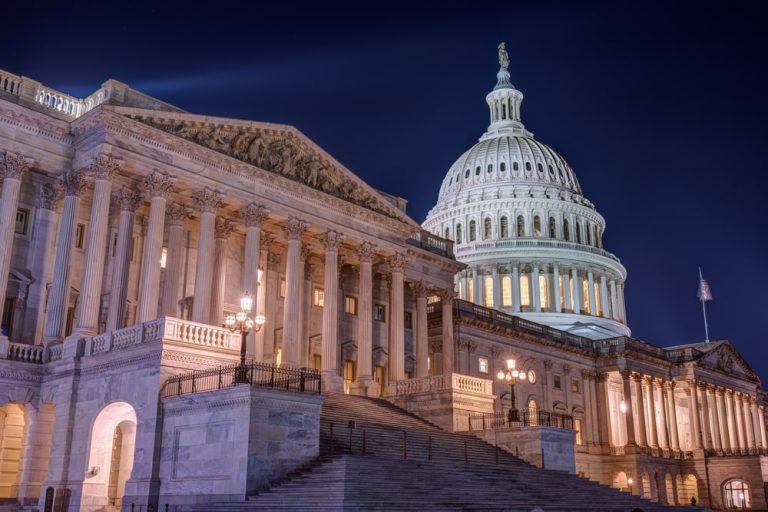In the August 2023 edition of The ICR D.C. Insider, we share our insights and analysis about developments in Washington that could have an immediate and long-term impact on your business.
What’s Next In Washington
With the Congressional summer recess now in full swing, attention in Washington continues to focus on the U.S. relationship with China as well as the ongoing actions of regulatory agencies. Chief issues include:
- China – Bipartisan efforts to pushback on China continued with the Senate’s 91-6 vote to impose outbound investment restrictions on U.S. investors when they take stakes in Chinese companies in certain key technology sectors. The Outbound Investment Transparency Act would require the Treasury Department, Commerce Department, U.S. Trade Representative (USTR), Department of Defense (DOD), and the Director of National Intelligence to be notified of any outbound investments made in:
- Semiconductor manufacturing and advanced packaging
- Microelectronics
- Artificial intelligence
- Quantum information science and technology
- Hypersonics
- Satellite-based communications
- Networked laser scanning systems with dual-use applications
- Any other technology that, if produced in the United States, would be included on the Commerce Control List and subject to an export license requirement to export the technology to a country of concern. This provision was left undefined.
The Senate will need to iron out its differences with the House, which passed its own version of these restrictions earlier this summer. The Biden Administration also continues to consider issuing an Executive Order that would establish an outbound CFIUS (Committee on Foreign Investment in the United States) body, although the timing of the announcement and its implementation date are in flux.
- Antitrust – In a major revision to U.S. antitrust guidelines, the Department of Justice’s Antitrust Division and the Federal Trade Commission (FTC) issued proposed new guidelines that detail how the two agencies will police proposed mergers, a move that could provide fresh legal support for the government’s efforts to block deals. According to the agencies, the 13 guidelines are an attempt to explain how they will identify potentially illegal mergers. The proposed guidelines are designed to help the public, business community, practitioners, and courts understand the factors and frameworks the DOJ and FTC consider when investigating mergers. The guidelines include, for the first time, explicit references to problems that can result from deals involving dominant technology companies and the roll up of smaller companies into a new, larger entity, as some private equity firms do.
- Self-Disclosure of Violations Urged – The Justice Department, the Department of Commerce’s Bureau of Industry and Security (BIS), and the Department of the Treasury’s Office of Foreign Assets Control (OFAC) issued a joint compliance note about the voluntary self-disclosure policies that apply to U.S. sanctions, export controls, and other national security laws, including recent updates to certain of those policies.
SEC
- Cyber Breach Reporting Rule Passed – In a party-line 3-2 vote, the Securities and Exchange Commission (SEC)approved a new rule that will require companies to disclose a cyber breach within four business days via a 8-K filing after determining the incident is serious enough to be material to investors. The rule would allow delays if the Justice Department deems them necessary to protect national security or police investigations. Also, each year companies will have to report material information about their cyber-security risk management, strategy, and governance in their annual reports. Federal compliance deadlines mean that companies must begin complying December 15, 2023, and reporting incidents starting on December 18, 2023.
- FY 2024 Budget – Chair Gary Gensler testified before the Senate Appropriations Subcommittee on Financial Services and General Government to support the agency’s FY 2024 $2.436 billion budget request, saying that the bulk of the increase would support currently authorized staffing levels and the agency’s real estate projects.
FTC
- Republican Nominees – President Biden nominated two Republicans to fill out the five-member FTC, which currently only has three Democrats. If confirmed by the Senate, the two Republicans will not change the balance of power at the agency.
- Chair Khan Faces House Judiciary Committee – Federal Trade Commission (FTC) Chair Lina Khan defended her aggressive legal strategy toward the country’s biggest technology companies as House Republicans charged that the agency has become overzealous and politicized, saying that more regulation has become more necessary as the companies have grown and that technology conglomeration has the potential hurt the economy and consumers.
Additional Key Developments
- Labor Department – The White House has, in effect, conceded that it lacks the votes to confirm Deputy Labor Secretary Julie Su as Secretary – but it nonetheless plans to indefinitely leave her in the role using a rule that allows a Labor Department Deputy to serve in an acting capacity indefinitely, unlike other nominees who are subject to a time limit. Republicans and trade groups alike argue that any regulations issued by the Labor Department without a Senate-confirmed secretary in place could be subject to legal challenge.
- House Republicans & ESG – Following through on their goal of making July “ESG Month,” Republicans on the House Financial Services Committee held numerous hearings, issued a report, and voted to send four bills aimed at deterring investment practices that incorporate Environmental, Social, and Governance (ESG) factors to the full House. Included in these bills are provisions that would change the proxy voting process, limit SEC disclosure requirements, and curtail the agency’s authority over shareholder proposals.
- Treasury Department – U.S.-based companies won relief from two pieces of the global minimum tax deal, and the changes will delay or reduce the taxes they were set to pay to foreign countries. Under the updated agreement negotiated by the Treasury Department, companies will have an extra year – until 2026 – before foreign countries can begin imposing new taxes on any U.S. company deemed to pay too little tax in the U.S. The clean-energy tax credits at the core of last year’s Inflation Reduction Act (IRA) will be counted more favorably than some companies had feared, offering certainty as a tax-credit trading market gets under way.
- Republican State Attorneys General – As a signal to corporate C-suites and boardrooms, following the Supreme Court’s recent decision finding affirmative action in college admissions unconstitutional, thirteen Republican state Attorneys General sent a letter to Fortune 100 companies warning them against race-based preferences in hiring, promotions, and contracting. The letter targets corporate Diversity, Equity and Inclusion (DEI) programs, as well as what it alleged were quotas and preferences in selecting suppliers.
- PCAOB – The Public Company Accounting Oversight Board (PCAOB) continues to make the results of its inspections public, announcing that roughly 40% of the audits they reviewed in 2022 will have had at least one deficiency, meaning that the audit firm failed to obtain sufficient evidence to back up its opinion. That is up from 34% in 2021 and 29% in 2020, with Chair Erica Y. Williams writing, “the PCAOB hasn’t hesitated to bring enforcement cases against auditors when appropriate. Last year we doubled the number of enforcement orders compared with 2021 and imposed the highest total penalties in history.”
- China – Key developments include:
- In written response to the Senate Finance Committee which has jurisdiction over trade, S. Trade Representative (USTR) Katherine Tai said that the Biden Administration will complete its review of Section 301 tariffs this fall. To date, the Biden Administration has been reluctant to lift the tariffs, which are currently set to expire on September 30, leaving companies unsure of future import costs.
- Commerce Secretary Gina Raimondo said she plans to visit China later this year despite the reported Chinese hacking of her department’s emails.



